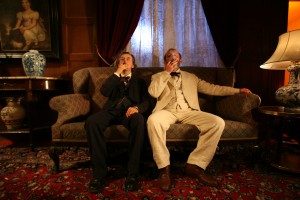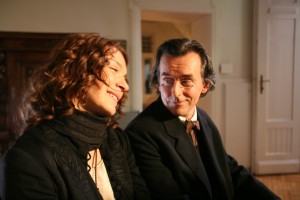New York Jewish Film Festival Opening Night: Mahler on the Couch
12 Jan2011
By Saul Sudin | Tweet
Percy Adlon & Felix Adlon, Austria/Germany, 2010; 97m
Inexplicably the opening night film of this year’s New York Jewish Film Festival, Mahler on the Couch contains no Jewish content whatsoever beyond the tangential fact that its main character was in fact born Jewish and discarded his religion, something not even mentioned in the film. Couch is the newest film from veteran German director Percy Adlon and co-writing and directing this time around is his son Felix. Together they weave the tale of 19th century Bohemian composer Gustav Mahler (Johannes Silberschneider – The Red Violin), and the marital problems that drove him to seek the counsel of Sigmund Freud (Karl Markovics – The Counterfeiters), another Jew who widely ignored his religion.
From the outset the film takes an odd approach, giving dreamlike glimpses of imagery that we are not prepared to understand yet. It is a full minute and a title sequence before we are given a context for what we are seeing – Mahler taking the train to Holland to seek a vacationing Freud. The early scenes of Freud and Mahler playing off one another are full of promise. Mahler seems too uptight and disoriented to open up, and over a stroll through the streets of the city he finally begins telling his tale of woe. Markovics plays Freud with a wonderful amount of humor and methodical eccentricities, and as his role dwindles during the course of the film, so too did my interest.
Though the title alludes to the relationship between Mahler and Freud, the real focus of the film is Mahler’s adulterous wife Alma (Barbara Romaner). Darting through the history of their relationship, we first meet her during the period in which she has already begun sleeping with founder-of-the-Bauhaus architect Walter Gropius (Friedrich Mucke) behind her husband’s back. Alma is immediately unlikable, and this context sets a foul taste in one’s mouth even when we later see her as a much more enjoyable young woman falling for Mahler during the burst of Vienna’s late 19th Century art scene. Alma goes through many loops of suppression and rebellion to the will of her husband, ultimately leaving the question of why she truly loved him in the first place ambiguous. A scene of her and Mahler in early love’s grasp is immediately followed by one of her reaction to his demands that she be a subservient wife, which includes giving up her own aspirations as a composer. No hints or indications were shown up until then that Mahler felt this way, and this 180 degree turn of a scene comes off as a bad joke, especially when this then becomes the main division between the couple for the remainder of the film. What’s more baffling though is that the very next scene jumps ahead in time again, and she is married, pregnant, and happy as the couple work on one of his compositions together. Though the emotional and tonal shifts she is forced to portray show off Romaner’s skill as an actress, her character is an ungainly mess.
By far the most distracting thing about the film is the constant stream of exposition we are given by side characters directly addressing the camera. In a story where we are given all flashbacks through the memories of a man opening his heart and mind to psychoanalysis, surely all the flashbacks would be from this characters perspective? And yet, we get monologues that directly address the audience with countless amounts of exposition as if additional people were given a chance to chime in on Mahler’s analysis. The facts do give a fuller understanding of the many real life people portrayed in the film (including other artistic notables like Gustav Klimt and Max Burckhard), but this is lazy and erratic storytelling.
The lighting and costumes shine as the most solid aspects of the film, and the score, made up of original compositions by the real Gustav Mahler as conducted by Esa-Pekka Salonen is as powerful as Mahler’s work has ever been. Unfortunately, each of these virtues gets buried under misuse. It is hard to appreciate well-lit cinematography when the camera’s use is erratic and odd, which one can only surmise was to try to accentuate the dreamlike quality of Mahler’s memories. Chunks of the film seem like excuses to set imagery to the music of Mahler, and sometimes cheap and clichéd moments are not at all helped by the score. When Mahler discovers a letter written to Alma by her secret suitor, the music stings suddenly like a parody of an overly dramatic television soap opera, not the respected stage operas that Mahler had written.
Finally, after a bleak first act, breathe of fresh air second, and a struggling third act, Mahler on the Couch ends without giving a conclusion to the Mahler vs. Alma relationship, the ultimate insult. So many moments felt accentuated and stretched to fill the running time and yet the closing text summing up the couple’s remaining time together hints at a much more interesting story left untold. Sometimes the world of modern Jewish cinema can be extremely limited in its offerings, but the question that keeps rolling around is why feature one as flawed as this? The New York Jewish Film Festival should be the worldwide leader in focusing on the best and brightest of current Jewish movies, but Mahler on the Couch says little about either Judaism or cinema.
Mahler on the Couch opens the 20th Annual New York Jewish Film Festival at Lincoln Center’s Walter Reade Theater with screenings this afternoon and evening.
The festival, presented by The Jewish Museum and the Film Society of Lincoln Center, runs January 12th – 27th, 2011.
For a complete schedule of films and to purchase tickets, visit http://filmlinc.com/wrt/onsale/nyjff.html
- In: Events|Exhibition Reviews
- Tags: Art History, Film, NYC






